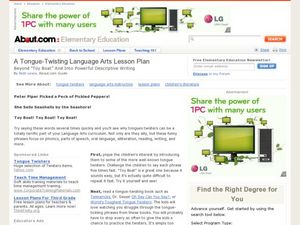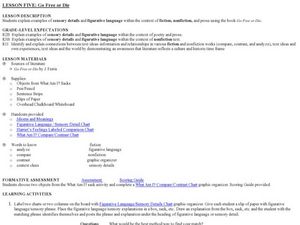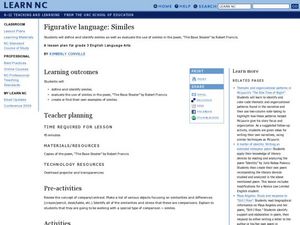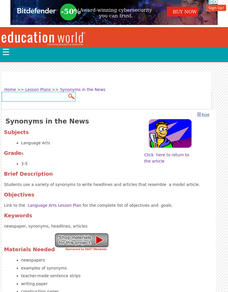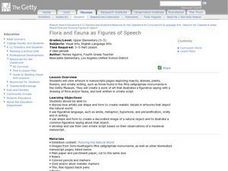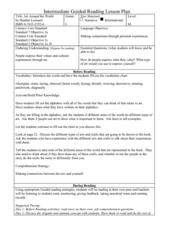MENSA Education & Research Foundation
Magical Musical Tour: Using Lyrics to Teach Literary Elements
Language arts learners don't need a lecture about poetry; they listen to poetry every day on the radio! Apply skills from literary analysis to famous songs and beautiful lyrics with a lesson about literary devices. As class...
Poetry Society
How do Poets Use Language?
Why do writers choose the language they do? Here's a resource that has the poet himself answer that very question. Joseph Coelho explains why he chose the words and images he used in his poem, "If All the World Were Paper."
Curated OER
Rudyard Kipling's Rikki-Tikki-Tavi: Mixing Words and Pictures
Create meaningful illustrations to accompany stories in a web-based art and literacy lesson focused on "Rikki-Tikki-Tavi" by Rudyard Kipling. The class takes a virtual art safari with the Museum of Modern Art and then discusses how...
Curated OER
A Tongue-Twisting Language Arts Lesson
Learners discover enunciation and alliteration by reading tongue twisters in class. In this language arts lesson, students listen and repeat some of the classic childhood tongue twisters along with their teacher. Learners write their...
Curated OER
Traditions and Languages of Three Native Cultures: Tlingit, Lakota, and Cherokee
Students explore the connections between tradition and language. They examine the environment, history and culture of the Tlingit, Lakota and Cherokee tribes and identify the importance of maintaining languages for oral traditions.
Curated OER
Fall Similes
Fall is like a beautiful painting come to life—or is it more like an overflowing cornucopia? Practice writing similes with a lesson plan on figurative language. As learners review simile structure, they come up with their favorite...
Curated OER
Two Greedy Bears
Improving listening comprehension skills is the goal of this language arts instructional activity. Young readers listen to the story Two Greedy Bears, stopping to have discussions with a partner. They predict outcomes and make inferences...
Scholastic
Point of View
The point of view in a story can dramatically change the story itself. Focus on finding the points of view in various reading passages with a language arts packet, which includes fiction and nonfiction text.
Curated OER
Go Free or Die: Figurative Language
Figures of speech, sensory details, and academic language are all targeted while reading Chapter Two of J. Ferris’ Go Free or Die. First, learners engage in an exercise to practice describing with detail. Then, partners use a chart to...
Curated OER
Looking and Learning in the Art Museum
Have you just visited an art museum? Or can you create a gallery in your classroom to visit? Pupils create an original drawing that reinforces what was learned in a visit to the art museum. They will view original art work and verbally...
Curated OER
Figurative Language Similes
Learners illustrate a simile. In this figurative language instructional activity, second graders are introduced to similes. They read the story Quick as a Cricket and talk about the similes used. Everyone chooses a simile and draws a...
Curated OER
Language Arts Skills: Listening and Speaking Strategies
Your class can practice communicating clearly. They practice listening and speaking through games such asTelephone and a social scavenger hunt. This is a solid lesson that helps apply good communication skills.
Curated OER
Language Arts Lesson Plan
Learners use a variety of synonyms to write headlines and articles that resemble a model article.
Lakeshorelearning
Read and Write about It
Reading informational text is a skill that transcends subjects and grade levels. Practice reading about different topics in various formats with a language arts lesson that includes opportunities for writing and research as well.
Curated OER
Flora and Fauna as Figures of Speech
What a lovely way to incorporate artwork into your language arts lesson. View artwork in illustrated manuscript pages, depicting insects, animals, plants, flowers, and ornate writing in the Getty Museum. Practice using figurative...
August House
The Archer and the Sun
Reinforce reading comprehension with a instructional activity about The Archer and the Sun, a Chinese folktale. Kids learn some background information about Chinese culture before reading the story, and answer literacy questions as they...
EngageNY
Close Reading of Thank You, Mr. Falker: Identifying the Superpowers of Reading
Third graders read excepts from the story, Thank You, Mr. Falker in order to gain practice in understanding an unfamiliar story by focusing on the details. They use a worksheet, embedded in the plan, which directs them to certain...
Curated OER
Art Around the World
The non-fiction book Art Around the World by Heather Leonard serves as inspiration for learning how art reflects cultures and values. New vocabulary and background knowledge are fleshed out before reading the story. Afterward, the class...
Curated OER
Ye Olde English Sayings
Discover the historical roots of modern English with your young learners, and then discover the meaning of many old English sayings. What a great chance to explore the history behind many of the words and phrases we use today!
Pearson
Catching the Sun: Tales from Asia
Explore the folklore of Asia and the South Pacific with this language arts instructional activity series. Complementing a reading of Catching the Sun: Tales from Asia by Jan M. Mike, this resource supports learners with understanding...
Scholastic
Quick as a Cricket Lesson Plan
Teaching young learners about similes is easy as pie with this primary grade language arts lesson. Following a class reading of the children's book, Quick as a Cricket by Audrey Wood, young readers learn the definition of a simile as...
Denver Art Museum
Words as Art
Elementary schoolers look at images of the art installation, Wheel -which is found at the Denver Art Museum. After a class discussion about how the words and symbols on the artwork make it more meaningful, the discussion turns toward how...
Curated OER
Vocabulary Building
A fabulous language arts lesson has readers focus on the vocabulary in the key words, expand and build new vocabulary, and practice three grammar concepts. They recognize key words as they relate to communicating at work. Pupils build...
Curated OER
It's Raining Cats and Dogs! Literary Devices and Figurative Language
Third and fourth graders study literary devices and figurative language. They view a PowerPoint presentation (which you must create) to review hyperbole, idiom, simile, and metaphor. They read and discuss the book There's A Frog in My...
Other popular searches
- English Language Arts
- English Language Arts Exam
- English Language Arts Games
- Deaf English Language Arts
- English Language Arts Music
- English Language Arts Heroes
- English Language Arts Skills
- English Language Arts Grade 3
- English/language Arts
- English Language Arts Poetry
- English Language Arts Rating=3
- English Language Arts Unit Sc





